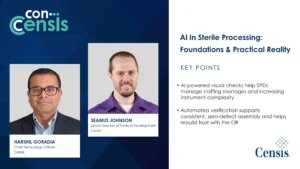How Healthcare Analytics Benefit Hospitals, Health Systems and Purchasers
On this episode of Healthcare Analytics Decoded, a Quantros podcast, Quantros Director of Data Science Andrew Johnson joined host Lauren Hickey to explore how hospitals, health systems and purchasers of healthcare benefit from utilizing data analytics software.
Johnson’s healthcare data science work has been published in dozens of scientific publications, and he’s spent time leading HCA Healthcare’s National Group data science team, held faculty positions in Public Health Administration at the University of Kentucky, and currently holds a faculty appointment in Healthcare Informatics at the Medical University of South Carolina.
In particular, Hickey and Johnson focused on the effects of a general shift from a fee-for-service-based model to a value-based one. Johnson said he advocates for any hospital, health system, etc. to have a list of “vital signs” it tracks in terms of metrics and data.
Those “vital signs” should flow down from the organization’s mission statement, but Johnson said there are also three categories of new additions to these signs that healthcare organizations can benefit from – compliance with care-practice models and best practices, outcome measures associated with value-based contracts, and patient experience metrics.
Once those primary “vital signs” – readmissions, length of stay, etc. – are taken care of, it’s beneficial to take a deeper dive into more specific metrics and find a way to compare a healthcare organization to its peers across the nation.
Healthcare analytics software, particularly a quality third-party solution, can help organizations improve performance, gain insights, find mutually beneficial partnerships, and more in a way that doesn’t strain internal teams and EMR solutions.
For the latest news, videos, and podcasts in the Healthcare Industry, be sure to subscribe to our industry publication.
Follow us on social media for the latest updates in B2B!
Twitter – @MarketScale
Facebook – facebook.com/marketscale
LinkedIn – linkedin.com/company/marketscale








